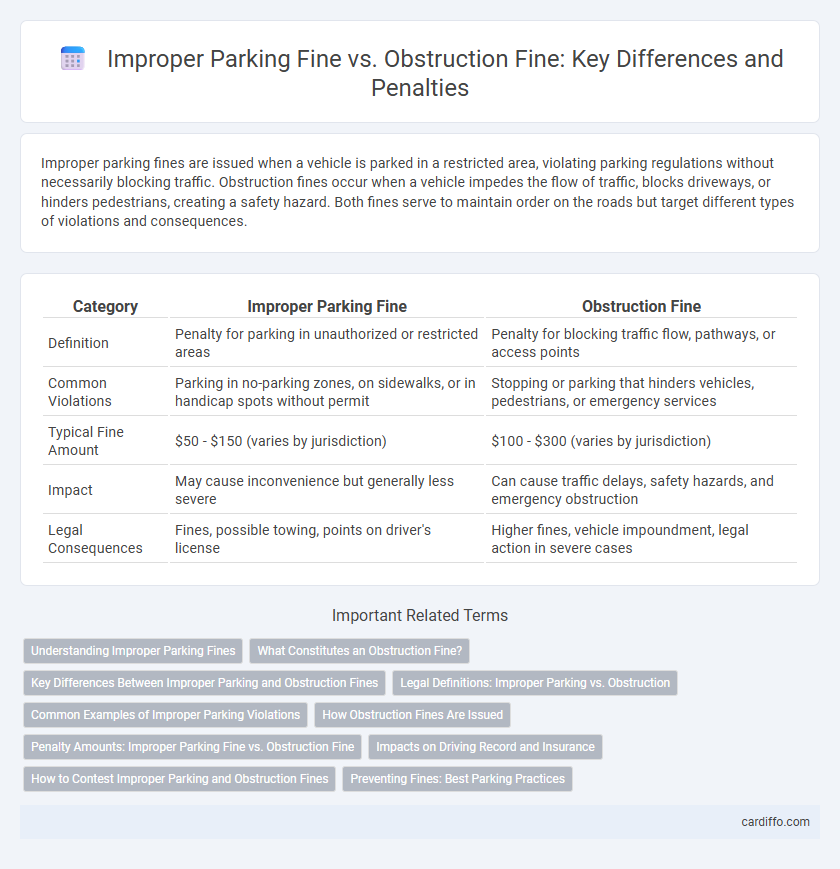Improper parking fines are issued when a vehicle is parked in a restricted area, violating parking regulations without necessarily blocking traffic. Obstruction fines occur when a vehicle impedes the flow of traffic, blocks driveways, or hinders pedestrians, creating a safety hazard. Both fines serve to maintain order on the roads but target different types of violations and consequences.
Table of Comparison
| Category | Improper Parking Fine | Obstruction Fine |
|---|---|---|
| Definition | Penalty for parking in unauthorized or restricted areas | Penalty for blocking traffic flow, pathways, or access points |
| Common Violations | Parking in no-parking zones, on sidewalks, or in handicap spots without permit | Stopping or parking that hinders vehicles, pedestrians, or emergency services |
| Typical Fine Amount | $50 - $150 (varies by jurisdiction) | $100 - $300 (varies by jurisdiction) |
| Impact | May cause inconvenience but generally less severe | Can cause traffic delays, safety hazards, and emergency obstruction |
| Legal Consequences | Fines, possible towing, points on driver's license | Higher fines, vehicle impoundment, legal action in severe cases |
Understanding Improper Parking Fines
Improper parking fines are issued when vehicles are parked in unauthorized areas, such as no-parking zones, sidewalks, or blocking driveways, and are typically less severe than obstruction fines. Obstruction fines apply when a vehicle impedes traffic flow, emergency access, or pedestrian pathways, posing higher safety risks and resulting in steeper penalties. Understanding the distinctions between these fines helps drivers comply with local traffic regulations and avoid costly citations.
What Constitutes an Obstruction Fine?
An obstruction fine is issued when a vehicle blocks traffic flow, pedestrian pathways, driveways, or emergency access points, impeding safe and efficient movement. Examples include parking in front of fire hydrants, bus stops, or within a designated loading zone. This fine differs from an improper parking fine, which typically addresses violations like parking beyond marked spaces or expired meters without necessarily causing obstruction.
Key Differences Between Improper Parking and Obstruction Fines
Improper parking fines are issued when a vehicle is parked in violation of local parking regulations, such as parking in no-parking zones or exceeding time limits. Obstruction fines apply when a vehicle blocks traffic flow, driveways, fire hydrants, or pedestrian pathways, creating safety hazards. The key difference lies in improper parking relating mainly to location rules, while obstruction fines address safety and accessibility issues caused by vehicle placement.
Legal Definitions: Improper Parking vs. Obstruction
Improper parking is legally defined as parking a vehicle in violation of specific regulations, such as exceeding time limits or parking in restricted areas, without necessarily blocking traffic or access. Obstruction fines apply when a vehicle physically hinders traffic flow, access to properties, or emergency services, constituting a more serious legal violation. Understanding the distinct legal definitions of improper parking versus obstruction is essential for accurately determining liability and applicable fines.
Common Examples of Improper Parking Violations
Common examples of improper parking violations include parking in no-parking zones, blocking driveways, and parking too close to fire hydrants. These violations typically result in fines that differ from obstruction fines, which are issued when a vehicle physically blocks traffic or pedestrian pathways. Understanding the distinction helps drivers avoid penalties related to both improper parking and roadway obstruction.
How Obstruction Fines Are Issued
Obstruction fines are issued when a vehicle blocks traffic flow, pedestrian pathways, or access to emergency exits, posing safety hazards or inconvenience. Law enforcement officers or traffic wardens assess the severity of obstruction, often using photographic evidence or eyewitness reports before issuing the fine. These fines are typically higher than standard improper parking fines due to the potential risk and disruption caused.
Penalty Amounts: Improper Parking Fine vs. Obstruction Fine
Improper parking fines typically range from $25 to $100 depending on local regulations, while obstruction fines can be significantly higher, often between $100 and $500 due to the increased safety risks involved. Obstruction fines may also include additional penalties if the blockage causes traffic delays or emergencies. Understanding the specific penalty amounts for each violation helps in assessing legal consequences and avoiding costly charges.
Impacts on Driving Record and Insurance
Improper parking fines generally do not affect driving records or insurance premiums, as they are classified as non-moving violations. Obstruction fines, however, can sometimes lead to points on the driving record if they involve blocking traffic or emergency vehicles, potentially increasing insurance rates. Understanding how each fine impacts legal and financial responsibilities helps drivers avoid unexpected consequences.
How to Contest Improper Parking and Obstruction Fines
To contest improper parking and obstruction fines effectively, gather clear evidence such as photographs and witness statements demonstrating lawful parking or minimal obstruction. Review local traffic and parking regulations to identify potential errors in the issued fine or procedural mistakes by enforcement officers. Submit a formal appeal with all supporting documents to the relevant traffic authority within the specified deadline to increase the likelihood of fine cancellation.
Preventing Fines: Best Parking Practices
Preventing fines for improper parking and obstruction requires adhering strictly to local parking regulations, such as avoiding no-parking zones, not blocking driveways, and respecting fire hydrant distances. Utilizing designated parking areas and following signage ensures compliance and reduces the risk of receiving fines. Regularly reviewing municipal parking rules and using parking apps can help drivers find legal spots and avoid costly penalties.
Improper parking fine vs obstruction fine Infographic

 cardiffo.com
cardiffo.com